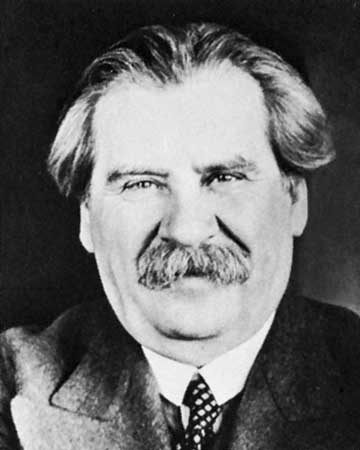Móricz, Zsigmond
Hungarian writer
born June 29, 1879, Csécse, Hung., Austria-Hungary
died Sept. 4, 1942, Budapest
 Hungarian realist novelist who wrote of villages and country towns.
Hungarian realist novelist who wrote of villages and country towns.While working as a journalist, Móricz published his first story (1908) in the review Nyugat (“The West”), which he later edited. In his many novels and short stories, finely characterized men and women of various social classes come into collision, and their fierce energies collapse or degenerate into a murderous passion. Some of his works centre obsessively on the morbid and doomed elements of society.
Móricz's greatest works include his first novel, Sárarany (1910; “Gold in the Mire”), and A boldog ember (1935; “The Happy Man”), which portray individualist peasant characters against the collective life of a village. Kivilágos kivirradtig (1924; “Until the Small Hours of Morning”) and Rokonok (1930; “Relatives”) deal with the life of the decaying provincial nobility. In Móricz's world, marriage and family life are fraught with bitter conflicts; but he also evokes pure, even idyllic, love as in Légy jó mindhalálig (1920; “Be Good Until Death”), often considered the finest book about children written in Hungarian, and in Pillangó (1925; “Butterfly”). He also wrote monumental historical novels, Erdély (1922–35; “Transylvania”) and Rózsa Sándor (1940–42). He was a master of Hungarian, his style absorbing elements of both the old language and the dialects.
- thermoregulation
- thermosphere
- thermostat
- the Rockettes
- the Rolling Stones
- Theron
- Theron, Charlize
- theropod
- Theroux, Paul
- The Royal Air Force
- The Royal Navy
- The Russian Primary Chronicle
- Thesaurus Linguae Latinae
- Thesavalamai
- The Scotsman
- The ServiceMaster Company
- Theseum
- Theseus
- the Sex Pistols
- the Shadows
- the Shirelles
- The Signal Companies, Inc.
- The Simpsons
- The Sims
- The Six Million Dollar Man